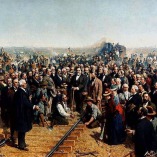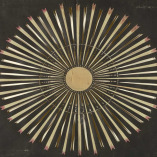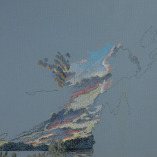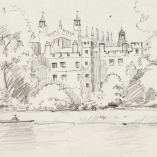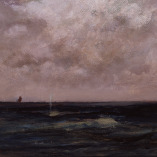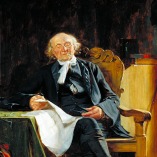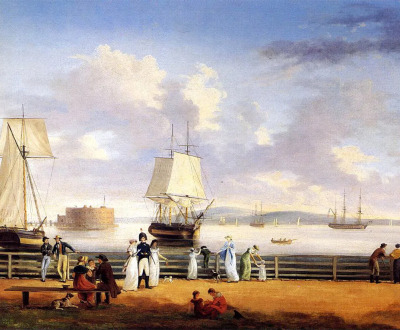
The Battery and Harbor, by Thomas Birch, 1810-1812. Wikimedia Commons.
“Well, I mean for starters it still is the greatest first sentence ever,” says Francine Prose in this week’s episode of The World in Time. “I mean, three words. A three-word first sentence. I think if you were to ask a kind of range of readers, ‘Can you think of a first sentence?’ You know, you probably get ‘It was the best of times, and the worst of times’ or ‘the worst of times, and the best of times,’ and people would get it backwards. But then you get ‘Call me Ishmael.’ Because it establishes this kind of—you know, so much of the book is about authority. About authority, and the lack of authority, and what authority is, and who has it, and what you do with it. And that sentence is just pure authority. Pure narrative authority. ‘Call me Ishmael.’ Bingo. It’s like, ‘Okay, well, we’re going to call you Ishmael.’”
This week on the podcast, the Quarterly’s editor-at-large Francine Prose returns for an in-depth conversation with Donovan Hohn about Moby Dick’s first chapter, “Loomings.” They consider the meanings of the verb to loom, whether Ishmael is likeable or funny, whether the American sermon influenced Melville’s oratorical prose, why the antebellum religious press condemned the novel, and what the best medicine might be for “the universal thump.”
Earlier episodes in this series: Episode 7 with Daniel Mendelsohn and Episode 8 with Wyatt Mason.
WORKS CITED
(In order of mention.)
“Drama Queens with Daniel Mendelsohn.” A New York Review Seminar, beginning September 10, 2025.
“The Political Novel with Edwin Frank.” A New York Review Seminar, beginning September 8, 2025.
“Oceanic Feelings with Lapham’s Quarterly.” Donovan Hohn and Greil Marcus, live at Clio’s Books in Oakland, CA, August 12, 2025. (Tickets available here.)
Greil Marcus. What Nails It. New Haven: Yale University Press, 2024.
Herman Melville. Moby-Dick: A Norton Critical Edition. Edited by Hershel Parker. New York: W.W. Norton, 2017.
Greil Marcus. “‘Give it up, sub-subs!’: Moby-Dick; or, The Whale.” In A New Literary History of America. Edited by Greil Marcus and Werner Sollors. Cambridge: Harvard University Press, 2009.
Francine Prose. “Francine Prose on Her Encounters with the Literary Strange,” Lit Hub, November 29, 2021.
Roberto Bolaño. 2666. Translated by Natasha Wimmer. London: Picador, 2009.
Thomas Pynchon. Gravity’s Rainbow. New York: Penguin Classics, 2006.
James Joyce. Ulysses. New York: Vintage, 1990.
Charles Dickens. A Tale of Two Cities. Edited and Introduced by Richard Maxwell. New York: Penguin Classics, 2003.
Harold Bloom. The Anxiety of Influence: A Theory of Poetry. Oxford: Oxford University Press, 1997.
Lapham’s Quarterly, Summer 2018: Water.
The Bible: Authorized King James Version with Apocrypha. Edited by Robert Carroll and Stephen Prickett. Oxford: Oxford University Press, 2008.
Lapham’s Quarterly, Spring 2021: Friendship.
American Sermons: The Pilgrims to Martin Luther King, Jr. Edited by Michael Warner. New York: Library of America, 1999.
John Cheever. “Goodbye, My Brother.” In The Stories of John Cheever. New York: Vintage, 2000.
Charles Darwin. The Origin of Species. Introduced by Sir Julian Huxley. New York: Signet, 2003.

